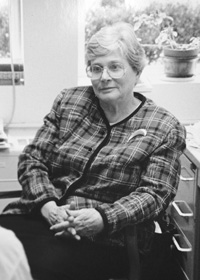Ann Sharp - Furman Mentors
Back to main
 ANN SHARP
ANN SHARP
As a music major at Furman, I consider many music professors to have been influential favorites. However, one of the perks of a liberal arts education is having favorite professors in various departments. For me, Ann Wyatt Sharp was one of them.
Early on, I landed in her Introduction to Literature section. As a linguistics specialist, Dr. Sharp taught us more than the beauty of poetry and short stories; she made us wrestle with every word and punctuation mark.
One of her required textbooks was a big, thick dictionary. To our knowledge no other professor required a dictionary for the intro class. When asked about this, Dr. Sharp explained that, in her experience, most college freshmen knew nothing about proper use of a dictionary, and that she would singlehandedly remedy the situation. So for the first two weeks of class we learned the intricacies of the dictionary.
One day she mentioned the “OED.” When a student innocently asked what the OED was, Dr. Sharp marched us down to the English offices and introduced us to the multiple volumes of the Oxford English Dictionary. “When you refer to the OED in my presence,” she quipped, “you say those initials with the utmost reverence.”
She taught other lessons through literature. When we studied Dudley Randall’s poem “Ballad of Birmingham,” a student questioned its significance: “I don’t get this poem, Dr. Sharp.” She proceeded to sit on the edge of her desk and educate us, from firsthand experience, about raising children in Birmingham, Ala., during the 1960s, teaching in the public schools while simultaneously earning her doctorate, the 16th Street Baptist Church bombing where four girls were killed, and the history of the civil rights movement.
After writing numerous papers for her — and never quite inching from a B+ to an A — I visited her office and asked, “What do I have to do to get an A?” She replied that a B+ was a good effort — an answer I found completely unsatisfactory.
“So what do you do every afternoon and evening?” she asked. I listed Furman Singers rehearsals, required student recitals, organ and harpsichord lessons, a part-time church organist job, and hours in an organ practice room.
“You know,” she said, “[star golfer] Beth Daniel was in my class a few years ago. Every day she spent hours perfecting her game, and she also wrote B+ papers. If you were an English major, I would expect all A’s, but a B+ is a good paper.” Still not the answer I wanted.
Dr. Sharp also supported and encouraged my musical development, attending my recitals both on and off campus. She has since made it a point to attend Furman Singers reunions that I have had the privilege of accompanying through the years.
My final, individually-tailored assignment for her class was a paper on “Easter Wings,” a poem from George Herbert’s collection The Temple. Knowing that the previous summer I had traveled with the Singers to Salisbury Cathedral in England, she was fully aware of the “Aha!” moment I would have as I read Herbert’s descriptions of his retirement in a village near Salisbury, spending his afternoons praying and writing while sunlight streamed through the stained-glass windows of Salisbury Cathedral.
I poured my heart into that project — and finally wrote my A paper for Ann Sharp.
— DAVID PERRY OUZTS '85